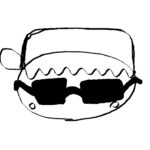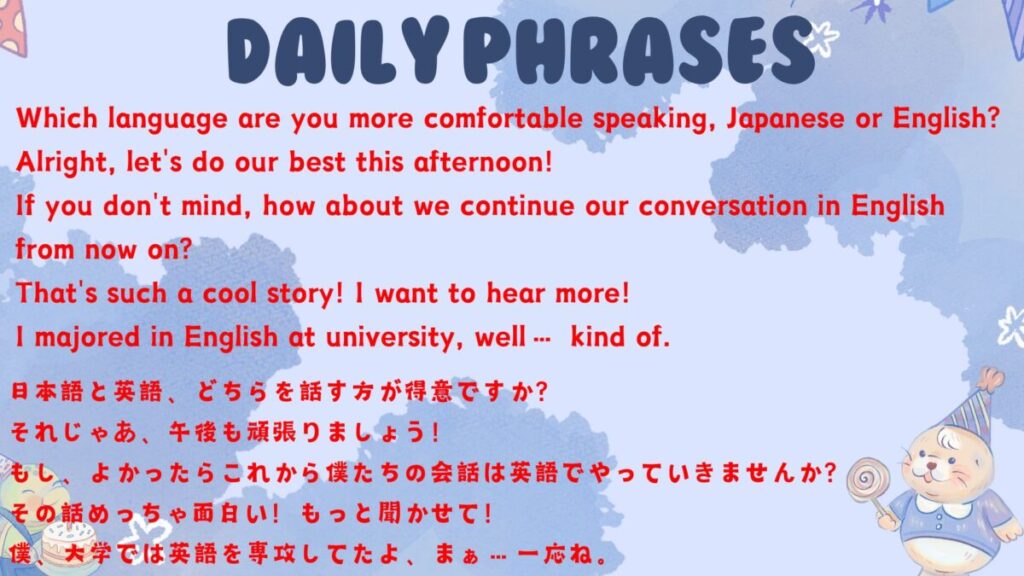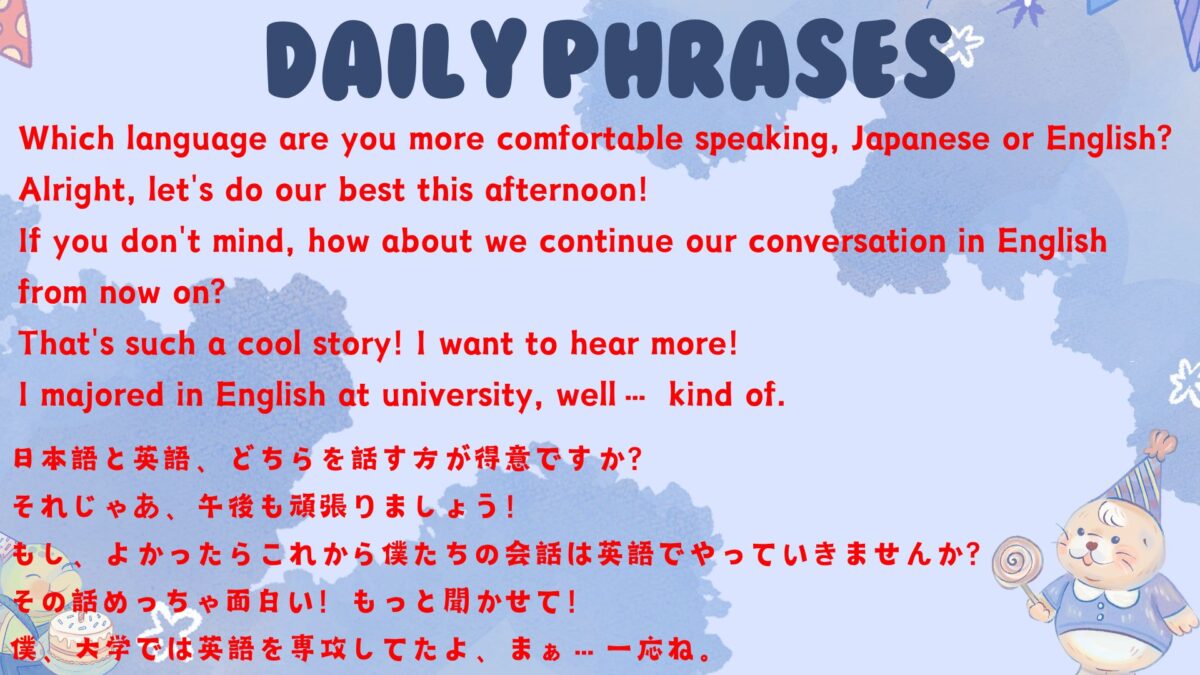
This web page uses this app, I’ll put the URL here so you can install and try it too. It will surely support your study.
(このウェブページはこのアプリを使用しています。ここにURLを貼りますので、あなたもインストールして試してみてください。きっとあなたの学習をサポートしてくれるでしょう。)

- 25. Which language are you more comfortable speaking, Japanese or English?(日本語と英語、どちらを話す方が得意ですか?)
- 1. Which language
- 2. are you more comfortable speaking
- 3. Japanese or English?
- 全体構造
- Which language are you more comfortable speaking, Japanese or English?
- which
- language
- which language
- are you
- more
- comfortable
- more comfortable
- are you more comfortable
- speaking
- Which language are you more comfortable speaking
- Japanese
- English
- Japanese or English
- Which language are you more comfortable speaking, Japanese or English?
- 意味
- 1. If you don’t mind
- 2. how about we continue
- 3. our conversation
- 4. in English from now on
- 全体の構造
- If you don’t mind, how about we continue our conversation in English from now on?
- if you
- don’t mind
- If you don’t mind
- How about
- continue
- we continue
- how about we continue
- conversation
- we continue our conversation
- in English
- from
- now on
- from now on
- how about we continue our conversation in English from now on
- If you don’t mind, how about we continue our conversation in English from now on?
- 3. well… kind of
- 全体のニュアンス
- I majored in English at university, well… kind of.
- majored
- majored in
- majored in English
- I majored in English at university, well… kind of.
- university
- at university
- I majored in English at university, well… kind of.
- I majored in English at university
- well
- kind
- kind of
- well… kind of
- I majored in English at university, well… kind of.
25. Which language are you more comfortable speaking, Japanese or English?(日本語と英語、どちらを話す方が得意ですか?)


1. Which language
- Which: 「どちらの~」という選択肢を尋ねる疑問詞。具体的な選択肢がある場合に使います。
- language: 「言語」。ここでは「日本語と英語」を指しています。
2. are you more comfortable speaking
- are: 主語「you」に対応する現在形の動詞(be動詞)。
- more comfortable: 比較級。「より快適な」という意味です。「comfortable(快適な)」を比較級にすることで「より~」を表現しています。
- speaking: 動名詞。「話すこと」という意味で使われています。ここでは「comfortable」という形容詞に続いて「~するのが快適」という意味を補足します。
補足: 「comfortable + 動名詞」で「~するのが快適だ」という意味になります。
例:
- I’m comfortable driving.(運転するのが得意・楽だ)
- She’s comfortable working here.(彼女はここで働くのに慣れている)
3. Japanese or English?
- 「Japanese or English」は選択肢を提示しています。
- or: 「または」。どちらかを選ぶときに使う接続詞。
全体構造
Japanese or English?: 比較対象を具体的に示す。
Which language: どの言語についての質問かを示す。
are you: 主語と述語で文章の主軸を構成。
more comfortable speaking: 「話すことにおいて、どちらが快適か」という詳細を説明。
Which language are you more comfortable speaking, Japanese or English?
which
language
which language
are you
more
comfortable
more comfortable
are you more comfortable
speaking
Which language are you more comfortable speaking
Japanese
English
Japanese or English
Which language are you more comfortable speaking, Japanese or English?
26. Alright, let’s do our best this afternoon!(それじゃあ、午後も頑張りましょう!)


意味
「それじゃあ、午後も頑張りましょう!」という意味です。
このフレーズは、仕事や活動を再開するときや、仲間と一緒に意気込みを共有したいときに使います。
1. Alright
- 意味: 「それじゃあ」「さて」「よし」といった軽いつなぎ言葉。
- 役割: 文の冒頭に置いて、次の行動に移る合図や気持ちの切り替えを示します。
- 類義語: “Okay” や “Well” と似た使い方です。
2. let’s do our best
- let’s
- 「let us」の短縮形で、「~しましょう」という提案や勧誘の表現。
- 話し手を含めた複数人で行動することを促します。
例: “Let’s go!”(行きましょう!)
- do our best
- do: 動詞で「行う」「する」という意味。
- our: 所有格で「私たちの」という意味。
- best: 「最善」「ベスト」。ここでは名詞として使われ、「最善を尽くす」という意味を表します。
- I’ll do my best.(最善を尽くします。)
- She did her best.(彼女は全力を尽くしました。)
3. this afternoon
- this: 指示詞で「この」という意味。時間を特定するときに使います。
- afternoon: 「午後」という名詞。午前(morning)と夜(evening)の間の時間帯を指します。
- 役割: 文の最後に置かれ、動作の時間を指定しています。
構造の分解
this afternoon: 時間を特定し、「午後」を示しています。
Alright: 「それじゃあ」と会話のスタートを切る部分。
let’s do our best: 主文。「私たちみんなで頑張りましょう」という提案。
Alright, let’s do our best this afternoon!
Alright
let’s
our
do our
best
do our best
let’s do our best
afternoon
this afternoon
Alright, let’s do our best this afternoon!
27. If you don’t mind, how about we continue our conversation in English from now on?(もし、よかったらこれから僕たちの会話は英語でやっていきませんか?)


意味
「もしよかったら、これからは私たちの会話を英語で続けませんか?」という意味です。
相手に提案をする際に、相手の気持ちを配慮しながら丁寧に話しかけています。
1. If you don’t mind
- If: 条件を表す接続詞で、「もし~なら」という意味です。
- you don’t mind: 「あなたが気にしないなら」という意味。
- mind は「気にする」「嫌がる」という動詞で、ここでは否定形(don’t mind)で使われています。
- If you don’t mind 全体で、「もし気にならなければ」や「もしよかったら」という丁寧な表現になります。
2. how about we continue
- how about ~: 「~してみませんか?」という提案を表す表現です。
- 例: “How about going out for dinner?”(夕食に行くのはどうですか?)
- how about の後に主語と動詞(we continue)が来る場合もありますが、名詞や動名詞を使うことが一般的です。
- we continue: 「私たちが続ける」という意味です。
- continue は動詞で「続ける」を意味し、ここでは主語 we(私たち)に対応しています。
3. our conversation
- our: 所有格の代名詞で「私たちの」を意味します。
- conversation: 「会話」という名詞。
- our conversation 全体で「私たちの会話」を指します。
4. in English from now on
- in English: 「英語で」という意味です。言語を表すときに in + 言語 を使います。
- 例: “Let’s talk in Japanese.”(日本語で話しましょう。)
- from now on: 「これからは」「今後は」という意味で、時間的な切り替えを表します。
- 例: “From now on, I’ll study harder.”(これからはもっと一生懸命勉強します。)
全体の構造
from now on: 時間の指定(これからは)。
If you don’t mind: 丁寧な条件提示(もしよかったら)。
how about we continue: 提案の表現(~しませんか?)。
our conversation in English: 話題の具体化(私たちの会話を英語で)。
If you don’t mind, how about we continue our conversation in English from now on?
if you
don’t mind
If you don’t mind
How about
continue
we continue
how about we continue
conversation
we continue our conversation
in English
from
now on
from now on
how about we continue our conversation in English from now on
If you don’t mind, how about we continue our conversation in English from now on?
28.That’s such a cool story! I want to hear more!(その話めっちゃ面白い!もっと聞かせて!)


1. “That’s such a cool story!”
- That’s: “That is” の短縮形。「それは」という意味で、ここでは相手が話した内容を指しています。
- such a: 「とても~な」という強調表現。”such + (a/an) + 形容詞 + 名詞” の形で使われます。
- 例: “such a beautiful day”(とても素晴らしい日)
- cool story:
- cool: 「かっこいい」や「面白い」というカジュアルな形容詞。
- story: 「話」や「ストーリー」を意味します。
- 全体の意味: “That’s such a cool story!” は、「それはとても面白い話だね!」というニュアンス。
2. “I want to hear more!”
- I want to: 「~したい」という願望を表すフレーズ。
- 例: “I want to go home.”(家に帰りたい)
- hear: 「聞く」という動詞。ここでは「聞こえる」ではなく、「相手の話を聞く」という意味で使われています。
- more: 「もっと」という意味。詳細や追加の情報を求める表現。
- 全体の意味: “I want to hear more!” は、「もっと聞きたい!」というニュアンス。
補足
このフレーズは非常に自然で、カジュアルな英語表現です。特に「such a cool story」の部分は、ネイティブスピーカーがよく使う強調表現で、相手の話を褒めたり、興味を示すのに適しています。
That’s such a cool story! I want to hear more!
That’s
such
such a
That’s such a
cool
story
cool story
That’s such a cool story
want to
I want to
hear
more
I want to hear
I want to hear more
That’s such a cool story! I want to hear more!
29.I majored in English at university, well… kind of.(僕、大学では英語を専攻してたよ、まぁ…一応ね。)


1. I majored in English
- I: 主語。話し手である「私」を指します。
- majored in: 「~を専攻する」という意味。動詞 major の過去形。
- major は通常「専攻する」という意味で、前置詞 in とセットで「~を専攻した」と表現します。
- 例: “She majored in biology.”(彼女は生物学を専攻していた)
- English: 専攻した科目を指し、「英語学」や「英語」に関する学問を意味します。
2. at university
- at: 前置詞で、「~で」を表します。ここでは university(大学)を指し、「大学で専攻した」という意味になります。
- イギリス英語では at university が一般的ですが、アメリカ英語では at college とも言います。
- 例: “He studied engineering at university.”(彼は大学で工学を学んだ)
3. well… kind of
- well…: 会話の間をつないだり、言葉を選びながら話すときの表現。日本語の「えっと…」や「まぁ…」に近いニュアンス。
- kind of: 「一応ね」「まぁそんな感じ」という控えめな言い方で、主張を弱めたり曖昧さを加えます。カジュアルな表現として日常会話でよく使われます。
- 例: “It’s kind of interesting.”(まぁ、面白いかな)
全体のニュアンス
この文全体は、英語学部だったことを伝えながらも、「完全に専門家ではない」という控えめで親しみやすいトーンを持っています。会話中に自然に使えるカジュアルなフレーズです!
I majored in English at university, well… kind of.
majored
majored in
majored in English
I majored in English at university, well… kind of.
university
at university
I majored in English at university, well… kind of.
I majored in English at university
well
kind
kind of
well… kind of
I majored in English at university, well… kind of.
25. Which language are you more comfortable speaking, Japanese or English?26. Alright, let’s do our best this afternoon!27. If you don’t mind, how about we continue our conversation in English from now on?28. That’s such a cool story! I want to hear more!29. I majored in English at university, well… kind of.(日本語と英語、どちらを話す方が得意ですか?)(それじゃあ、午後も頑張りましょう!)(もし、よかったらこれから僕たちの会話は英語でやっていきませんか?)(その話めっちゃ面白い!もっと聞かせて!)(僕、大学では英語を専攻してたよ、まぁ…一応ね。)



